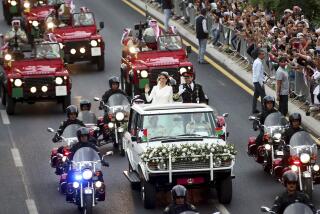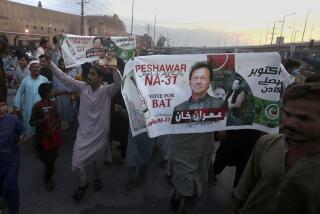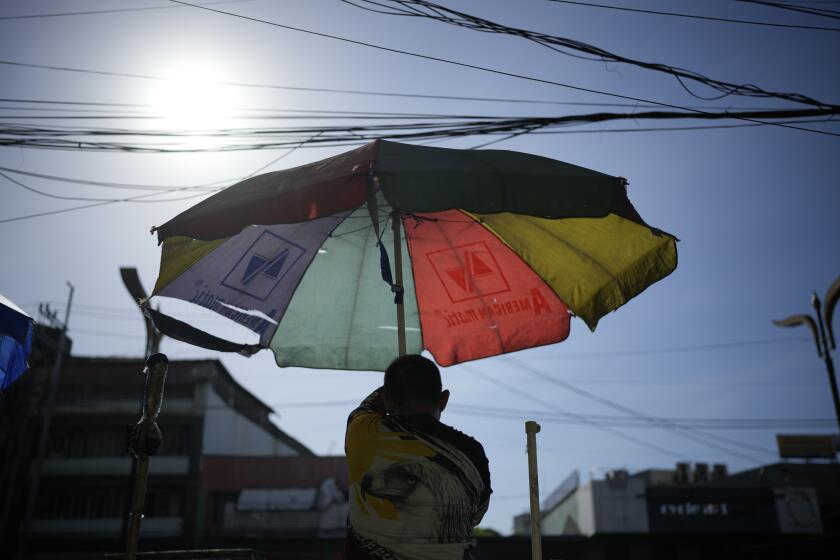Bahrain prisoner release might actually intensify demands
At least 300 people were freed early Wednesday from Bahrain’s jails, but rather than calming the waters, the releases could very well intensify the nation’s already charged atmosphere.
With an angry public now calling for the ouster of King Hamed ibn Isa Khalifa, some of those pardoned could find an audience far more receptive than when they were jailed by the island’s security services.
Some shouted “Death to Khalifa!” on Wednesday night as they listened to accounts of torture in Bahrain’s jail.
The country has been turned upside down in the nearly two weeks since protesters first assembled in Pearl Square in Manama, the capital, and began a campaign of peaceful civil disobedience.
The protest, led by Shiite Muslims, stunned the country’s Sunni Muslim monarchy. In a ham-fisted response, security forces attacked the protesters, killing at least seven people and wounding hundreds more.
In the last week, the king has largely avoided the public eye, mindful that his citizens blame him for ordering his troops to open fire. He has handed the responsibility for promoting reconciliation to his son, Crown Prince Salman ibn Hamed Khalifa.
Still, the king implemented the freeing of 308 detainees, thought to be held for political reasons. The list included 23 activists and politicians jailed late last summer on charges of plotting to overthrow the state.
It was far from clear whether the move would help defuse the resentment and anger directed at the monarch. The situation has parallels with Egypt, where recently toppled President Hosni Mubarak announced reforms after the public had already risen up against him and was no longer satisfied with concessions that previously would have silenced them.
Bahrain’s king traveled Wednesday to neighboring Saudi Arabia to meet and welcome home Saudi King Abdullah, who had received medical treatment abroad.
On his return, King Abdullah announced a salary increase for Saudi citizens. The move could very well be aimed at squashing any discontent. The desert kingdom has watched, with trepidation, the popular revolts sweeping other autocracies across the Middle East.
The possibility of Bahrain falling under Shiite control disturbs Saudi Arabia. Rumors have abounded about Saudi forces coming across the causeway linking the two nations to assist the Bahraini army in suppressing protests. Though no evidence has been uncovered, people here have seized upon the rumors of Saudi Arabia’s intention of sabotaging Bahrain’s Shiites.
Among those released Wednesday was Abdul Jalil Singace, a senior leader of the hard-line Shiite party Al Haq. At his home in a Manama neighborhood, where new skyscrapers are springing up, he made it clear that he had not mellowed because of the king’s decision to free him.
“I think we have given him enough chances; the last decade has been an opportunity for him to change,” Singace said. “He has had his chances. Basically, he has to leave. Hamed has to leave. The people of this land have to govern themselves.”
Singace suggested that if the monarchy survives, the king should step down in favor of Crown Prince Salman. A clean break could save the Khalifa dynasty if Salman accepted a stronger parliament and a reduced role for himself.
In the evening, Singace stood on a small stage, with Bahraini flags fluttering, and waved to a crowd shouting, “The people will bring the regime down!”
Those with moderate parties wondered what the effect would be of freeing Singace and the return of the head of his party, Hassan Mushaima, who had been in exile in Britain. Mushaima had not yet arrived as of late Wednesday.
Those from the moderate Shiite religious party Wefaq acknowledged the possibility that hard-liners might try to seize the moment.
“The hard-liners are gaining popularity, but at the end of the day the opposition really needs to deliver and to translate all these realities into political gains,” said Jasim Hussain Ali. “There is so much anger at the regime; that’s why people [are starting] to talk like radicals.”
More to Read
Start your day right
Sign up for Essential California for news, features and recommendations from the L.A. Times and beyond in your inbox six days a week.
You may occasionally receive promotional content from the Los Angeles Times.






